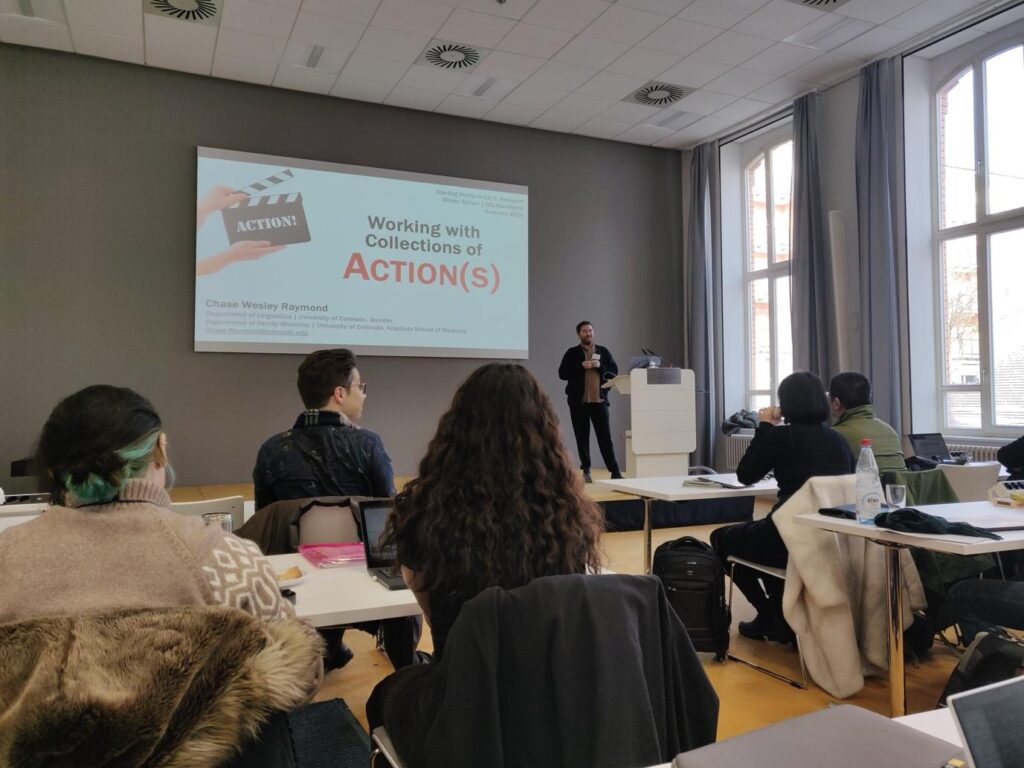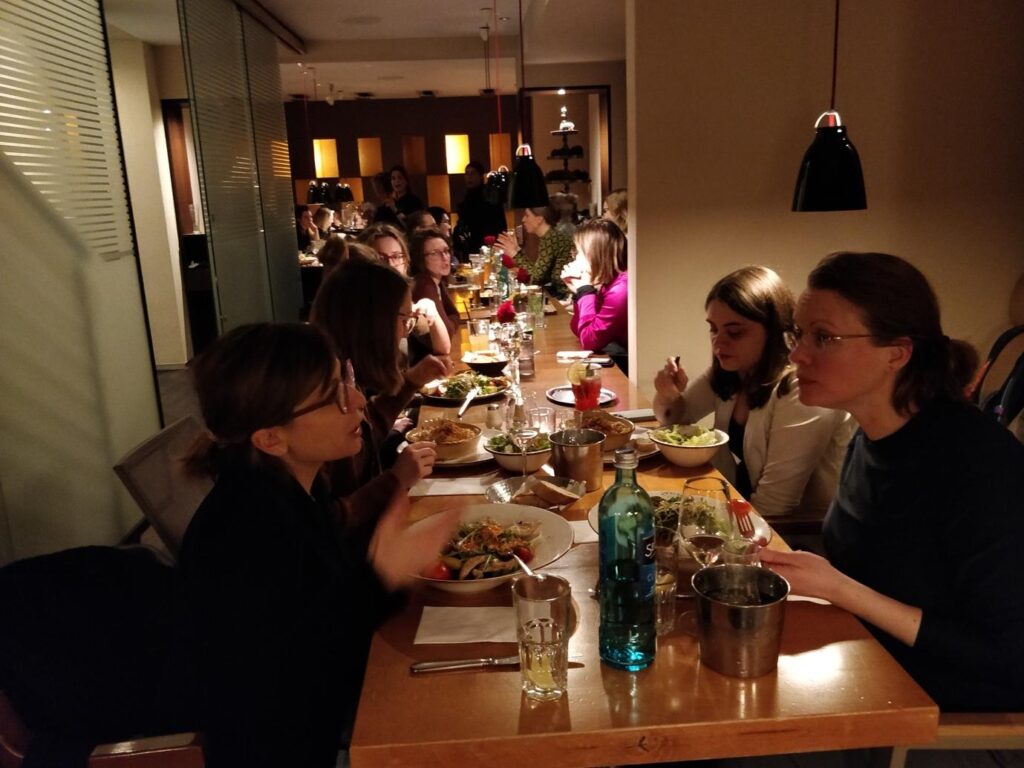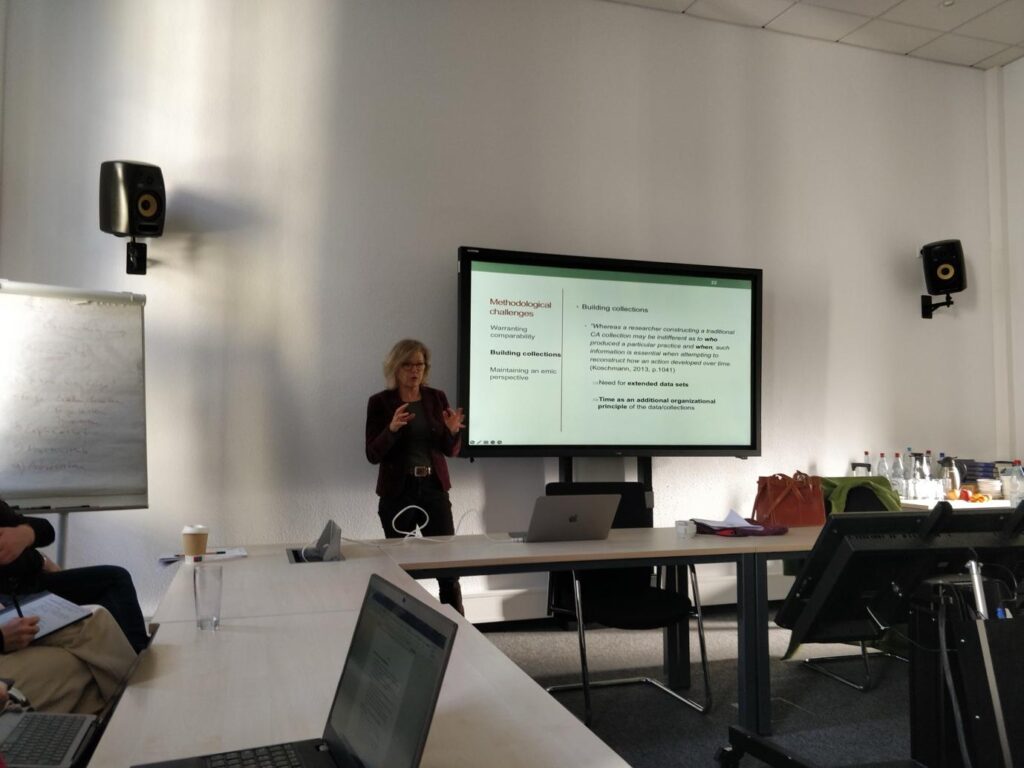Viktoria Strandberg & Patricia Linnemann
The International Winter School ‘Points of departure in Conversation Analysis and Interactional Linguistics: Action, form(at) and beyond’ was organized by the Leibniz-Institute for the German Language and took place in Mannheim, Germany, February 17th–19th 2025. The goal of the Winter School was to promote three different starting points within Interactional Linguistics and Conversation Analysis: starting with form, starting with action, and starting ‘elsewhere’. The Winter School was organized as a three-day workshop where participants could reflect on methodological challenges and pitfalls within each approach, as well as pros and cons. The 39 participants were early-career researchers from all over the world, and the Winter School was facilitated by Emma Betz (Waterloo), Arnulf Deppermann (Mannheim), Elliott M. Hoey (Amsterdam), Lorenza Mondada (Basel), Florence Oloff (Mannheim), Simona Pekarek Doehler (Neuchâtel), Chase Wesley Raymond (Boulder) and Jörg Zinken (Mannheim). Each day started with a plenary talk by one of the facilitators, and was then continued by hands-on analytic work in groups.

Dr. Uwe-Alexander Küttner welcoming the participants.
The first day, participants were welcomed to the main hall of the Institute by the local organizers Dr. Alexandra Gubina and Dr. Uwe-Alexander Küttner, and presented with a name tag and a goodie bag from the Leibniz-Institute for the German language. In their introduction, the organizers made sure that we got to know the Winter Schools’ schedule as well as each other through several group activities. Then, Emma Betz introduced the topic of the day, starting with form, in her plenary talk Building responses to questions with turn-initial “okay”. She gave us a very interesting behind-the-scenes look on the way from her first finding of answer-initial OKAY to the final paper (DeSouza et al. 2021), sharing her own experiences from building a collection and providing valuable tips on methodological shortcomings and pitfalls when starting with form in an interactional analysis. This was illustrated with the particle okay, and the challenges this particle presents to analysts. According to Betz, particles in general are an interesting phenomenon for interactional researchers as they occur frequently and are relatively easy to collect, however this also creates challenges as the key analytic principle of CA, the next turn proof procedure, cannot be applied to particles that do not create turns themselves.

Some of the snacks from the coffee break (of course, there was coffee and tea, too).
After the first coffee break, which provided us with great snacks and chat opportunities, the participants were divided into three groups, one English-speaking group and two German-speaking groups. In the English group, facilitated by Elliott Hoey and Chase Wesley Raymond, participants practiced building and analyzing a collection starting from form using data on the let me X construction. The group was divided into 3 sub-groups that each collected and analyzed their own observations in the let me X data. In the late afternoon, these groups presented their findings to each other. Group 1 observed that let me could be used for accounts of temporal non-progressivity. In a similar vein, group 2 noticed that let me was mobilized as an account for halting. The third group analyzed let me as a multi-unit turn projector doing prefatory work and request-like actions that mobilize an immediate response, verbally or visually, by others.
During lunch, there was ample time to talk to other participants and foster new contacts, also across the three working groups.


The lunch wraps provided by the IDS Mannheim.
The two German groups worked on the same data set. They had 20 short excerpts from the German FOLK corpus (cf. Reineke, Deppermann & Schmidt 2023), which consisted of different ways to mobilize others. The first German group, whose facilitators were Emma Betz and Jörg Zinken, started with a thorough single-case analysis. Later, they focused on a particular format in the data, namely the use of infinitives. They worked on this in small groups, and at the end of the day, presented their previous work to Arnulf Deppermann, who was the facilitator of the second German group. His group set their own paths working with the data and ended up dealing with action a lot already. In the course of the Winter School, it became clear to all of us that form and action are deeply intertwined. The second German group also talked to the other group’s facilitators at the end of the day, Emma Betz and Jörg Zinken. By switching facilitators between the two German groups, we could benefit from insights of different renowned researchers and hear various perspectives about their work on forms.
The first day ended with a joint discussion in the main hall with all participants in both the German and English speaking groups. This session began with an individual reflection where we recapped the first day of the Winter School. After that, we formed groups with participants from the different English and German speaking groups from the afternoon, and shared our experiences of the first day.
The second day started with Chase Raymond’s plenary talk on Working with Collections of Action(s). Drawing from his work on very different kinds of actions, he talked about many practical considerations on starting with actions. The considerations ranged from picking a candidate phenomenon in the beginning of the process, to recipient-designing the findings to papers published in different disciplines. He encouraged us to try out new ways to play with the data in order to figure out what kind of actions happen there. A special recommendation was to print out up to six relevant transcript extracts, sit down on the floor with them and use this space and freedom to compare and arrange them. Raymond talked about the many issues that we had encountered the day before in the group work, and inspired us to hang in there: There is still a whole lot of actions to investigate and discover.

Raymond introducing the topic of day 2: starting with actions.
After the plenary talk on starting with actions, participants were again divided into the same language-specific groups as the day before. The English group, with the same facilitators, started to work on selected data from the Corpus of Language Discrimination in Interaction (Raymond et al. 2025). The workshop centered on the action of threatening, an action that – to the extent of the facilitators’ knowledge – had not been researched before in CA and IL. The group was divided into three subgroups, and each presented their own analysis of the action of threatening, e.g., how the opinion of the public is evoked and used as a threat by someone experiencing discrimination in a recorded interaction.
The German groups were facilitated by Emma Betz and Jörg Zinken. In both groups, we struggled with the task of defining and labeling the specific actions we found, even in our small corpus. Also, clustering the data into different action categories proved challenging. But the groups managed to have presentable results ready at the end of the day, when the two groups merged for a final discussion. Although we all had now worked on the same dataset for two days, we presented different foci, from a coding scheme or the form of infinitives to the action of accounting.
In the evening, we had our conference dinner at Starks restaurant. Here, especially the local Käsespätzle received praise from the international participants.

Dinner at Starks restaurant
On the third and final day, participants no longer worked in language-specific groups, but in two larger groups mixing participants from different languages. This day consisted of two workshops about starting “elsewhere”, which were facilitated by Lorenza Mondada and Simona Pekarek-Doehler, respectively. In the morning and afternoon, one group participated in Mondada’s workshop while the other group was working with Pekarek-Doehler. Mondada’s workshop was titled Where to start when you are dealing with materiality in interaction. The workshop started with a lecture on mobilization of resources in social interaction. In the lecture, Mondada discussed topics such as the possible distinctions between actions and practices, problems related to the notion of affordances, and how a resource is locally defined. After a short coffee break, Mondada conducted a data session with video data from a shop encounter in a French bakery to show us the very fine-grained systematicity in the multimodal conduct of – only seemingly simple – everyday interactions.
Simona Pekarek-Doehler’s workshop focused on an approach that currently is not often applied in CA, namely, taking on a longitudinal perspective. In her workshop, Longitudinal CA: methodological challenges of starting with form/action, she gave us an introduction about what characterizes this special way of investigating forms and actions. She especially addressed the challenges this poses to CA, because there is a need to collect comparable data at different points in time, which calls for defining the focus and planning ahead before beginning the recordings. Pekarek-Doehler gave us the opportunity to try this out. In groups, we were asked to design a longitudinal CA study for each of the three different research branches: developmental studies, socio-historical changes, and interactional histories. We discussed and refined our ideas together and gained valuable insight about the aspects to consider for a longitudinal study.

Pekarek-Doehler conducting her workshop on longitudinal CA.
We left the Winter School inspired and motivated about our own CA projects. The hands-on practice, valuable discussions, and practical tips were very useful for answering many of the method- and process-oriented questions that probably appear in every research project at some point. Additionally, the Winter School offered great network opportunities to get to know not only the international team of renowned facilitators, but also many other CA researchers on various career stages. We should probably say that we believe the goal of the Winter School was exceeded, and that the Winter School is an excellent initiative from senior researchers.
References
DeSouza, Darcey K., Betz, Emma, Clinkenbeard, Mary, Morita, Emi, Shrikant, Natasha & Tuccio, William A. 2021. Taking a detour before answering the question: Turn-initial okay in second position in English interaction. Language & Communication 76: 47-57.
Raymond, Chase Wesley, Saul Albert, Elliott M. Hoey, Sarah M. Adams, Natalie Grothues, Jacob Henry, Olivia H. Marrese, Megan Pielke, Emily Reynolds & Regina Gayou Tom 2025. Language Policy as interactional practice in everyday public space: The Corpus of language discrimination in interaction. Language.
Reineke, Silke, Deppermann, Arnulf & Schmidt, Thomas 2023. Das Forschungs- und Lehrkorpus für Gesprochenes Deutsch (FOLK). Zum Nutzen eines großen annotierten Korpus gesprochener Sprache für interaktionslinguistische Fragestellungen. In Deppermann, Arnulf, Fandrych, Christian, Kupietz, Marc & Schmidt, Thomas (eds.): Korpora in der germanistischen Sprachwissenschaft. Berlin/Boston: de Gruyter, 71-102.
